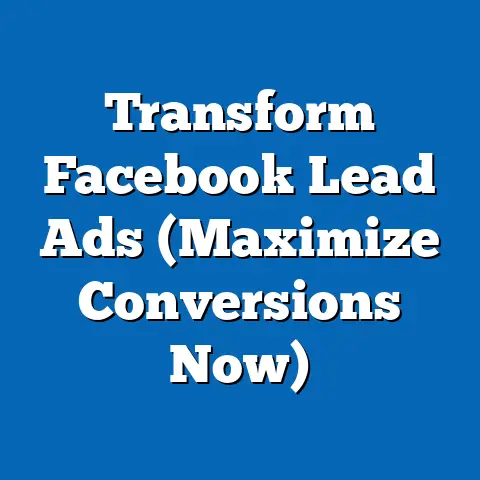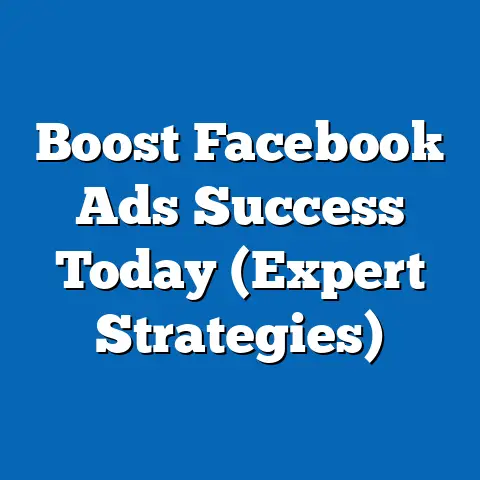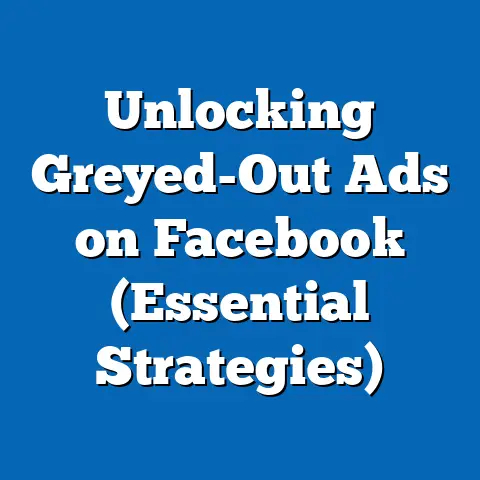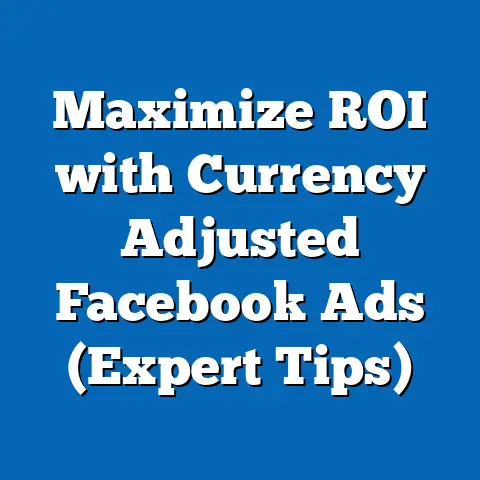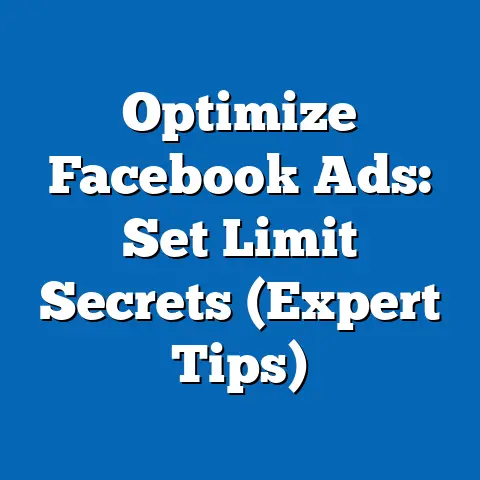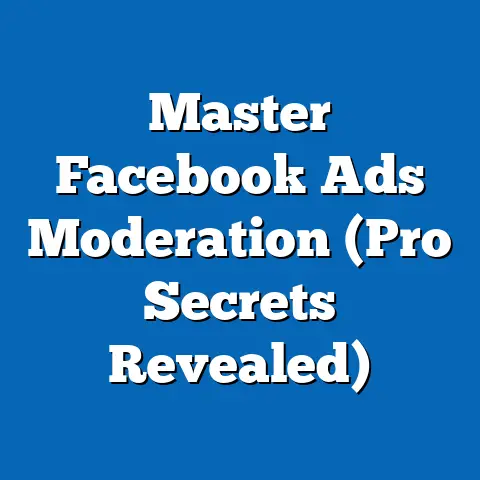Unlock Facebook Ads Advances for 2025 (Essential Insights)
The digital advertising landscape is in constant flux.
It’s a whirlwind of algorithm updates, emerging technologies, and shifting consumer preferences.
As marketers, we’ve all become accustomed to this “ease of change.” I remember back in 2010, the biggest shift was simply understanding how to target based on interests – now, we’re talking about AI-powered personalization and immersive AR experiences!
Staying ahead of the curve is no longer a luxury; it’s a necessity for businesses that want to not just survive, but thrive.
As we hurtle towards 2025, understanding the upcoming trends and features in Facebook Ads is absolutely crucial.
This article will be your guide to navigating that future, ensuring you’re ready to leverage the platform’s latest advancements for maximum impact.
The Current State of Facebook Ads
As of 2024, Facebook Ads remains a powerhouse in the digital advertising world.
I’ve personally seen it drive incredible results for businesses of all sizes.
Its strength lies in its massive user base and sophisticated targeting options.
We’re talking about granular demographics, interests, behaviors, and even lookalike audiences built from your existing customer data.
Facebook’s pixel allows for precise tracking of conversions, giving you a clear picture of your ROI.
The existing analytics tools within Facebook Ads Manager are robust.
They offer a wealth of data on ad performance, audience engagement, and campaign effectiveness.
However, the landscape has definitely shifted, especially with the increasing focus on data privacy.
Data Privacy’s Impact: The introduction of iOS 14.5 and similar privacy measures has made tracking and targeting more challenging.
This has forced marketers to become more creative and rely on first-party data, contextual advertising, and broader targeting strategies.
It’s also pushed the platform to develop aggregated event measurement and conversion API solutions.
The ROI of Facebook Ads: Despite these challenges, Facebook Ads continues to deliver impressive ROI.
A recent study by Statista found that Facebook advertising ROI can range from 3x to 5x, depending on the industry and campaign objectives.
I’ve seen even higher returns for clients who have a well-defined strategy, compelling creative, and a deep understanding of their target audience.
Takeaway: Facebook Ads is still a powerful tool, but success requires a nuanced understanding of its current features and the evolving privacy landscape.
Focus on building a strong data foundation and crafting creative that resonates with your audience.
Emerging Trends Leading to 2025
Looking ahead to 2025, several emerging trends are poised to reshape the Facebook Ads landscape.
These trends are driven by technological advancements, changing consumer behaviors, and the platform’s own efforts to innovate.
1.
The Rise of AI and Machine Learning: AI is no longer a futuristic concept; it’s already transforming how we approach advertising.
By 2025, I expect AI-powered ad targeting and personalization to become even more sophisticated.
Facebook’s Advantage+ campaign budget will be the new normal.
This means algorithms will be able to analyze vast amounts of data in real-time to identify the most receptive audiences and deliver personalized ad experiences.
- Implication: This shift will require marketers to embrace a more data-driven approach, focusing on providing high-quality data to feed the algorithms and letting AI handle the heavy lifting of optimization.
I foresee the need to understand how AI is making decisions, so we can work with the technology to get the best results.
2.
Video Content and Immersive Experiences: Video has been king for a while, but by 2025, expect it to become even more dominant.
Short-form video, driven by the popularity of TikTok and Reels, will continue to thrive.
Furthermore, immersive experiences like AR/VR will become more integrated into Facebook Ads.
- Implication: Marketers will need to create engaging video content that captures attention quickly and delivers value.
AR/VR ads will offer unique opportunities for interactive experiences, allowing consumers to virtually try on products or explore virtual environments.
I believe that being able to create high quality video ads will be crucial to success.
3.
Social Commerce and Shoppable Ads: The line between social media and e-commerce is blurring, and Facebook is at the forefront of this trend.
By 2025, social commerce will be even more seamless, with shoppable ads allowing consumers to purchase products directly within the platform.
- Implication: Businesses will need to optimize their product listings for social commerce, ensuring that they are visually appealing and provide all the necessary information for consumers to make a purchase.
This means focusing on high-quality product photography, detailed descriptions, and easy checkout processes.
4.
The Metaverse and Virtual Advertising: While still in its early stages, the metaverse represents a significant opportunity for advertisers.
As more people spend time in virtual worlds, Facebook (Meta) will likely offer new ways to reach consumers through virtual advertising.
- Implication: Marketers will need to experiment with virtual advertising formats, such as branded avatars, virtual events, and in-world product placements.
This will require a new level of creativity and a willingness to embrace the unknown.
I believe that this will open up new opportunities for brands to connect with consumers in immersive and engaging ways.
Takeaway: The future of Facebook Ads is driven by AI, video, social commerce, and the metaverse.
Marketers who embrace these trends and adapt their strategies accordingly will be well-positioned for success in 2025 and beyond.
New Features and Tools on the Horizon
Facebook is constantly evolving, and the platform is expected to roll out several new features and tools by 2025 that will further enhance the advertising experience.
1.
Enhanced Analytics Tools: Expect to see more advanced analytics tools that provide deeper insights into consumer behavior and ad performance.
These tools will likely leverage AI to identify patterns and trends that would be difficult for humans to detect.
- Potential Features: Predictive analytics, real-time performance dashboards, and automated reporting capabilities.
I foresee the ability to drill down into specific audience segments and understand their unique needs and preferences.
2.
Interactive Ad Formats: Facebook is likely to introduce more interactive ad formats that encourage user engagement.
These could include polls, quizzes, games, and other interactive elements that capture attention and drive conversions.
- Potential Features: Customizable ad templates, drag-and-drop interfaces, and integrations with third-party interactive content platforms.
I think that this will allow marketers to create more dynamic and engaging ad experiences that resonate with their target audience.
3.
Enhanced Storytelling Capabilities: Facebook is expected to enhance its storytelling capabilities, allowing advertisers to create more immersive and engaging ad narratives.
This could involve longer video formats, interactive stories, and integrations with AR/VR experiences.
- Potential Features: Storyboarding tools, cinematic ad templates, and integrations with creative content platforms.
I believe this will enable marketers to craft compelling narratives that capture attention and drive emotional connections with their audience.
4.
Cross-Platform Advertising: Facebook is likely to further integrate its advertising platform with other Meta-owned properties, such as Instagram, WhatsApp, and Messenger.
This will allow advertisers to reach consumers across multiple touchpoints with a single campaign.
- Potential Features: Unified campaign management dashboards, cross-platform audience targeting, and integrated reporting capabilities.
I foresee this simplifying the process of reaching consumers across multiple platforms and maximizing campaign reach.
5.
Beta Programs and Early Access: Keep an eye out for beta programs and early-access features that Facebook offers to advertisers.
These programs provide an opportunity to test out new features and provide feedback to the platform, giving you a head start on the competition.
Takeaway: The future of Facebook Ads is bright, with several new features and tools on the horizon that will empower marketers to create more engaging, personalized, and effective ad campaigns.
Stay informed about these developments and be prepared to adapt your strategies accordingly.
Case Studies and Success Stories
To illustrate the power of Facebook Ads and the importance of adapting to change, let’s look at a few case studies and success stories from brands that have leveraged the platform effectively.
1.
The E-Commerce Brand That Leveraged Video Ads: An e-commerce brand selling sustainable clothing saw a significant increase in sales by shifting its focus to video ads.
They created short, engaging videos showcasing their products in action, highlighting their unique features and benefits.
By targeting specific interest groups and using lookalike audiences, they were able to reach a highly receptive audience and drive conversions.
- Key Insight: Video ads are highly effective at capturing attention and driving engagement.
By focusing on creating high-quality video content and targeting the right audience, brands can achieve significant ROI.
2.
The Local Restaurant That Used Location-Based Targeting: A local restaurant increased its foot traffic by using location-based targeting on Facebook Ads.
They created ads that promoted special offers and events, targeting users within a specific radius of their restaurant.
By using compelling visuals and clear calls to action, they were able to attract new customers and boost sales.
- Key Insight: Location-based targeting is a powerful tool for reaching local customers.
By creating relevant ads and targeting users in the right geographic area, businesses can drive foot traffic and increase brand awareness.
3.
The Tech Startup That Embraced Interactive Ads: A tech startup used interactive ads to generate leads and drive product demos.
They created a quiz that helped users determine which of their products was the best fit for their needs.
By collecting user data through the quiz, they were able to personalize their follow-up communications and increase conversion rates.
- Key Insight: Interactive ads are a great way to engage users and collect valuable data.
By creating interactive experiences that provide value to the audience, businesses can generate leads and drive conversions.
4.
The Travel Company That Leveraged AR/VR: A travel company created an AR/VR experience that allowed users to virtually explore different destinations.
By allowing users to experience the destination firsthand, they were able to generate excitement and drive bookings.
- Key Insight: AR/VR experiences can be highly effective at engaging users and driving conversions.
By creating immersive experiences that showcase the unique aspects of their products or services, businesses can capture attention and drive sales.
Takeaway: These case studies demonstrate the importance of creativity, adaptability, and a deep understanding of the Facebook Ads platform.
By staying informed about the latest trends and features and experimenting with different strategies, businesses can achieve significant success with Facebook Ads.
Conclusion
The world of Facebook Ads is constantly evolving, and the advancements expected by 2025 will further transform the way businesses connect with consumers.
Embracing change and staying informed about these developments is crucial for marketers who want to thrive in the future.
By understanding the emerging trends, exploring new features and tools, and learning from successful case studies, you can position yourself for success in the ever-changing landscape of Facebook Ads.
Don’t wait until 2025 to start planning your strategies.
Begin experimenting with new ad formats, exploring AI-powered targeting options, and optimizing your content for social commerce today.
The insights provided in this article will serve as a foundation for your future campaigns, ensuring that you are ready to leverage the full potential of Facebook Ads.
Call to Action
Now it’s your turn!
Share your own experiences with Facebook Ads in the comments below.
How are you planning to adapt your strategies for the future?
What new features are you most excited about?
Let’s start a conversation and learn from each other as we navigate the exciting world of Facebook Ads together.

